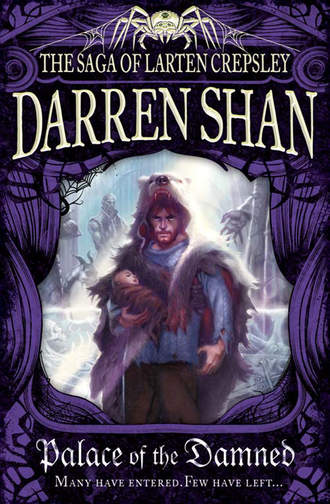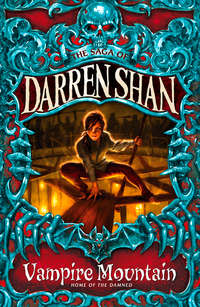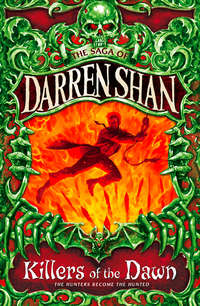
Полная версия
Palace of the Damned
Leaving the cloak of fur on the floor by the coffin, Larten strode to the edge of the chasm running through the cave. The crack in the ice started at one side and ran all the way across to the other. It was five feet wide at its narrowest, fifteen at its widest. It was a relatively recent fissure — a couple of coffins at opposite sides had fallen into it and others nearby had been disturbed.
Larten gazed down into the abyss. He couldn’t see the bottom. The crack seemed to stretch all the way to the centre of the earth. He picked up a stone and dropped it, but there was no sound of it landing.
“So it ends,” Larten whispered, wondering how long he would fall, if there was ice at the bottom or fiery magma. Maybe this was a supernatural rip and ghosts would attack him and keep him alive, suspend and torment him. In this mysterious, eerie cave he could believe just about anything.
Larten was eager to leap, but first he made himself remember his master, Seba Nile, and praised his name. He thought about Wester too, the vampire who had been like his brother. The Princes, Vancha, Malora, Evanna. He considered them one by one and said a few words for each, apologising to those who might be hurt by his suicide. No vampire could be proud of taking his own life, but if you had to, there was a right way and a wrong way to go about it. This would be Larten’s final act and he didn’t want to pass poorly from this world.
When he had said his farewells, Larten stared once again into the abyss and smiled. He was glad it was over. Sorry that things had come to this, but at least he need suffer no more. If he was reborn and given a second chance, as some believed, he would try to do better next time round. In this life he had struggled from the start and it was maybe for the best that he was done with it.
Larten wanted to roar the death cry of the clan – “Even in death may I be triumphant!” – but there could be no triumph for him in suicide. Keeping his lips tight, he leant forward and let himself fall.
As he toppled over the edge, his eyes widened. Imminent death has a way of focusing the senses and in that moment Larten knew he was a fool. Yes, he had strayed, hit rock bottom, shamed himself and disappointed those who had tried to help him over the years. But life had been given to him by a higher force and he had no right to surrender his grip on it so cheaply. He should have fought on and done all that he could to redeem himself. This was selfish and wasteful. Cowardly. Nobody should voluntarily give up on life. If it was your time to die, death would calmly claim you. Otherwise it was your duty to press on and live.
Larten cried out with dismay and flapped his arms wildly to regain his balance. But it was too late. His weight had carried him clear of the ledge and he was falling. There could be no going back. Gravity had hold and all that lay ahead of him now was the fall, the crash and…
A hand grabbed the back of his shirt and Larten came to a stunned halt. Then, as his life hung in the balance and he blinked with confusion and dread, someone chuckled and said, “Well, well, what have we here?”
CHAPTER THREE
Larten tried to turn round to see who had hold of him. As he did, his shirt ripped and he lurched forward again.
“Careful,” the stranger tutted, grabbing another handful of shirt. “These stitches were not meant to take such a strain. If you don’t keep very still, they’ll snap and that will be the end of you.”
Larten gulped and stared at the drop beneath him. He had never felt so desperate to live. Or so helpless. “Who are you?” he gasped.
“The eye of the storm,” the man answered cryptically. “The heart of the sun. The shadow in your soul.” He paused solemnly, then teasingly added, “But you can call me Desmond.”
Larten had thought he could never feel any colder than when he’d been trudging through the purgatorial snow, but when he realised who had hold of him, a chill spread from the pit of his stomach that was even icier than the coffin of Perta Vin-Grahl. “Mr Tiny!” Larten cried.
There was an approving grunt. “My reputation has preceded me. That is how it should be. Now tell me, Master Crepsley, do you want to live or shall I let you fall?”
Larten’s throat tightened. Mr Tiny waited a few seconds, then shook him playfully. “It’s all the same to me, dear boy. This doesn’t have to be a reprieve. I can release you if you wish. Just say the word and…”
Larten felt the small man’s fingers loosening. “No!” he screamed.
“I didn’t think so,” Mr Tiny laughed and suddenly Larten was flying through the air. But not the air of the chasm — Mr Tiny had thrown him across the room and he landed in an untidy heap near the base of Perta Vin-Grahl’s coffin, on top of which the baby was still wriggling and gurgling.
Larten sat up, panting heavily, and watched the infamous meddler come towards him with a curious waddle. The tiny man had white hair, rosy cheeks and a thick pair of spectacles. He was dressed in a bright yellow suit and a green pair of boots. Larten recalled the flashes of colour that he had followed to this cave. “You led me here,” he muttered.
“Do you think so?” Mr Tiny smiled.
“I saw green and yellow when I was in the snow.”
Mr Tiny seemed to consider that. “It might have been me,” he conceded. “Or it might have been coincidence.” He beamed and there was nothing remotely warm in his smile. “Or it could have been destiny.”
Mr Tiny stopped close to Larten and gazed around the cavern. There was a large, heart-shaped watch pinned to his breast pocket. Larten had heard many vampires comment on that watch and wonder at its true purpose. Mr Tiny was older than any of the clan. According to the legends, he had been on this planet before the rise of vampire or man, maybe before life itself began. Nobody knew how powerful he was, or what his exact designs might be, but his love of chaos and suffering had been well documented over the millennia.
“I made a nice job of it, didn’t I?” Mr Tiny said, nodding at the roof. “You’d never believe how difficult it was to fit those crystals.” Larten frowned. “You created this?”
“Just the roof,” Mr Tiny said modestly. “Perta and his cronies did the rest. I added the crystals to cast more of a shine on things. You don’t have to worry,” he added. “The crystals filter the rays of the sun. This light can’t do you any harm.”
Larten hadn’t been thinking about the beams, but now that his attention was drawn to it, he realised he felt none of the pain that he did in normal sunlight.
“I like this place,” Mr Tiny said. “It’s atmospheric. I often come here when I’m in a reflective mood and want to get away from the hustle and bustle of the modern world. Even the mightiest of us need our time outs, as humans will refer to it in another few decades or so.”
Larten failed to pick up on Mr Tiny’s reference to the future. He was more concerned with why the diminutive man of magic had led him here… why his life had been spared… and what Desmond Tiny was planning for him next.
“Why did you save me?” Larten asked.
Mr Tiny sniffed. “You didn’t want to die. Most mortals don’t, even if they find themselves in as desolate and soul-destroying a spot as you. Almost all of those who take their own lives wish at the last moment that they hadn’t. They see at the end how much they’ve given up, how precious life is, even when it’s treated them like dirt and crushed their dreams. Many think they’ve passed beyond hope, but they never really have, not until they pass beyond life itself. Alas, that knowledge comes too late for most would-be suicides and they die with regret. Very few are offered the chance that you have been handed.”
“And I appreciate it greatly,” Larten said truthfully. “But why save me? Out of all who teeter on the edge, why pull me back?”
Mr Tiny shrugged. “It was your destiny.”
Larten shook his head. “My destiny was to fall. You changed it.”
“Did I?” Mr Tiny’s eyes sparkled. “Maybe it was my destiny to save you. In that case this was your true destiny, not death.” Mr Tiny laughed at Larten’s confused expression. “Fate might seem like a complex puzzle, but it’s simple at its core. Near-misses and might-have-beens are nothing more than shadows of destiny. Each man has only one true path in life. You thought that yours ended here. You were wrong.”
Mr Tiny approached the baby and tickled his stomach. As the boy giggled, Mr Tiny asked, “Does he have a name?”
“No,” Larten said.
“Every mortal should have a name,” Mr Tiny murmured. “It separates you from the beasts of the wild. How about we call him… Gavner Purl?”
Larten blinked dumbly. “As good a name as any, I suppose.”
“Then Gavner Purl it is.” Mr Tiny smiled and licked his lips. “Now that we’ve named him, how about we carve him up and share him between us? Little Gavner looks tasty.”
“Leave him alone,” Larten snapped, standing quickly and snatching the boy from the drooling man in the yellow suit.
“Be careful,” Mr Tiny said coldly. “I don’t take kindly to orders. If I want the child, I’ll take him.” He smiled again. “But I don’t. You can have the mewling, bony thing. I already ate today.” Mr Tiny nodded politely at Larten and turned towards the exit.
“Wait!” Larten called him back. “You cannot simply walk out on us. You never answered my question about why you saved me.”
Mr Tiny shrugged. “And I have no intention of doing so. I helped you because it was my wish. That’s all you need to know.”
“And now you are just going to leave me?” Larten asked.
“Yes,” Mr Tiny said. “I’ve done all that I care to do for you. You’re on your own from this point on.”
“What if I jump into the chasm again?”
“You won’t,” Mr Tiny said confidently.
“But how will we get out of here?” Larten roared as Mr Tiny headed for the tunnel. “The baby cannot endure the cold much longer. I do not know where we are. We have nothing to eat. How will we survive and get back to civilisation?”
“You’ll find a way, I’m sure,” Mr Tiny answered without looking round. And then he was gone, leaving an astonished Larten and a hungry Gavner Purl alone with the dead in the palace of coffins and ice.
CHAPTER FOUR
As the engine roared and the aircraft picked up speed and bounced over the grass, Larten glanced around and thought, This is never going to fly! The wings looked like six boxes, three on either side, a mix of bamboo and silk, joined by something that Alberto had called aluminium. How could a contraption like this ever leave the ground?
“Go on, Vur!” Alicia cried, shaking her fist in the light of the almost full moon. “You can do it!”
Alberto stood next to her, doubled over with laughter. He’d told Larten not to try – no amateur could fly his 14-bis, his beloved bird of prey – but Alicia had dared him and Larten never backed away from a dare.
“By the black blood of Harnon Oan!” Larten growled, then pulled on the lever that was meant to control the craft. To his astonishment – as well as Alicia’s and Alberto’s – the aircraft lifted a few feet. He flew for all of five seconds before the wheels hit the ground. He thought that would be the end of it, but the aircraft continued to power ahead, and when he tried the lever again he rose maybe nine feet in the air and flew for eighty or ninety feet before crashing back to earth.
One of the wings dipped and tipped towards the ground. Moments later the aircraft screeched to an abrupt halt and Larten was thrown forward to roll across the grass until he came to a painful stop.
“Vur!” Alicia yelled, racing after him. “Are you all right? Have you broken any bones, my darling?”
“I am intact,” Larten muttered, standing and wincing.
When Alicia saw that he hadn’t been seriously injured, she threw herself into his arms and knocked him down again. Larten was laughing by the time Alberto caught up with him, mock-wrestling with the beautiful Alicia.
“That was superb!” Alberto applauded. “It must have been a hundred feet at least.”
“I think slightly less,” Larten said.
“Even so… magnifique! I’ve managed no more than two hundred feet myself and I’m an expert.”
“You do not need to be an expert to fly one of these,” Larten sniffed. “Just insane.”
“Didn’t you enjoy it, darling?” Alicia asked.
“No,” he grunted. “Monsieur Santos-Dumont and the Wright Brothers can wage their war for the air without me. I have experienced all the joys of flight I ever intend to. It is a crazy form of transport, Alberto. If you heed my advice, you will get out of this business immediately. There is no future in aircrafts.”
With that, the smiling vampire turned his back on the shuddering machine and never stepped aboard an aeroplane again.
Paris in 1906 was a chic, vibrant, multi-layered wonder. The Eiffel Tower, still standing seventeen years after it had been erected as a temporary exhibit for the Universal Exposition, was the tallest building in the world. The métro had opened six years ago, providing Parisians with a fascinating ride deep beneath the streets. The city was flooded with artists, many hoping to improve on the advances made some years earlier by the Impressionists. It had the most acclaimed museums, the finest restaurants, the rowdiest nightlife. From the respectability of the Louvre to the seediness of the Moulin Rouge, Paris had something for everyone.
For Larten Crepsley, above all else it had Alicia Dunyck, a woman with whom he’d fallen in love.
They had met for the first time four years earlier, when Larten fetched up in Paris at random. He had been going by the name of Vur Horston, which was how Alicia still knew him. After what he had done on the ship to Greenland, he wanted to try and forget about Larten Crepsley, at least for a while, possibly forever.
Gavner brought the pair of them together. The baby had survived the trek back from the icy wastes and grown into a sturdy little boy. It would have been easy for Larten to rear him as his son, but he didn’t feel that he had the right. He had never lost sight of the fact that he had killed the boy’s parents. He believed it would be hypocrisy of the highest order if he took their place and let the boy love him as a father.
Although Larten fed and cared for Gavner on their way back, he was stern with the boy and refused to treat him with love. He believed a night would come when he and the adult Gavner Purl must address the nature of his foul crime. He didn’t want any sort of emotional attachment to confuse the orphan when that night came.
Larten tried to offload the boy a number of times, but nobody seemed to want him. He could have abandoned Gavner and left him to the workings of fate, but he needed to be sure that the boy would have a chance to prosper. So he kept Gavner by his side longer than he would have liked, crossing the world with no real plan, waiting for the right set of parents to accept the growing child.
In Paris he finally found a home for the boy. He had made money gambling, and attracted a wealthy circle of fair-weather friends. He had no interest in these vain, frivolous people except to find parents for Gavner. Wealth wasn’t important to Larten, but the rich had a much easier time in life than the poor, so he thought he might as well settle the boy with a prosperous couple.
He met Alicia by chance. She was the cousin of one of the men he gambled with. She came one night to experience a little of her cousin’s sordid world. Alicia stood out among the others in the saloon. She didn’t consider herself superior to the women of low class or the men of dark vices, or look upon them with disdain. But there was a sadness in her expression as she watched the lost creatures chase their petty pleasures. Larten, who knew much about sadness, was moved by it and made an excuse to talk with her and meet her again in a place more fitting than a den of wine, women and cards.
Alicia was suspicious of the pale, scarred, orange-haired man of mystery. There were many rumours about the strange Vur Horston, that he’d made his money from the illegal slave trade, that he was a highly paid assassin, that he avoided the sun because he had signed a contract with the devil and would burst into flame if exposed to the pure light of the day world.
“Nothing so dramatic,” Larten laughed when Alicia put this accusation to him. “I have a severe skin condition, that is all.”
She was wary of the stranger and didn’t encourage further visits, but Larten was persistent, popping up wherever she went, bending her ear, discussing art and dancing with her. (He had no great love of either, but made an effort to impress.) He realised that lavish presents wouldn’t impress her, so instead he scoured the markets for quirky, beautiful flowers or charming, cracked ornaments, which were worthless but came with an interesting story.
As she slowly warmed to him, Larten introduced her to Gavner, who was a sullen, quiet boy. Gavner knew Larten preferred silence and a sense of distance, so he was more withdrawn than most children. Like all young boys, he craved love, but having received none from the man who refused to act as his father, he hoped to earn Larten’s approval by behaving as coldly as the adult did.
Larten didn’t tell Alicia that he was hoping to give away the boy. Instead he told her that Gavner was the son of an old friend and that he’d vowed to look after the orphan when his parents died. He let her think it was his intention to bring up Gavner on his own.
“Why are you so hard on him?” Alicia asked not long after she got to know the child. “You’re kind and gentle with me. Why not with Gavner?”
“I raise him the way I was raised,” Larten answered stiffly. “Discipline is good for a growing boy.”
“But you push him away every time he tries to get close to you,” she said.
Larten grunted sourly, but inside he was smiling. As he had hoped, Alicia made even more of an effort with Gavner, encouraging him to smile, laugh, play and enjoy the world. A bond grew between them, and although Alicia was young and free, with hopes of having children of her own one day, she didn’t hesitate when Larten asked if she wished to take the boy and rear him as her son.
That should have been the end of the matter. Larten had finally rid himself of his charge and was free to search for a place in the wide, lonely world. But he had grown fond of Alicia, so he made one excuse after another to stay. Weeks became months, and months became years. He still occasionally spoke of leaving, but it had been a long time since he’d truly meant it. He had found unexpected peace in Paris, and while he refused to admit it, deep down he hoped to stay with Alicia to the end of her relatively short, normal life.
They returned home after Larten’s adventure in the aircraft, still laughing. Alberto Santos-Dumont was a good friend of Alicia’s. She couldn’t understand his obsession with building the first proper aircraft (“The Wrights use catapults to launch their clumsy contraptions! How can that be a real aircraft?” he would protest whenever the American pioneers were mentioned), but she enjoyed watching the machines that he built, especially when they got off the ground. Larten didn’t normally come with her when she visited Alberto – he preferred night pursuits to those of the day – but he was fascinated by her reports. When he’d casually declared that any fool could fly the simple aircraft, she put the challenge to Alberto and convinced him to let Larten try the 14-bis one bright, moonlit night.
“You could be an aircraft operator,” Alicia joked as they let themselves in. “Alberto says there will be large aircraft soon, with seats for passengers. You could get a job flying people from one town to another.”
“Alberto lives in a fantasy world,” Larten snorted. “Aircraft are a novelty. They will never replace trains or boats. Only a fool would think otherwise.”
“I don’t know,” Alicia sang, tweaking his nose, then went to check on Gavner. He was fast asleep and snoring heavily. She’d never known anyone who snored as loudly as Gavner Purl.
Larten was staring out of the window when she returned. He was thinking about Malora and the people on the ship, as he often did in quiet moments like this. No matter how much happiness he found with Alicia, the sorrows of the past were never far from his thoughts.
Alicia studied him, gazing at his troubled reflection in the glass, wishing she could do something to rid him of his grief. There was much about his life that was a secret. She knew he’d had an unhappy past, that he was hiding a lot from her. But that didn’t matter. She loved him and was sure he’d reveal the full truth to her in time. And no matter how disturbing it was, she would still love him and do what she could to help him deal with it.
After all, she thought as she slid forward and embraced Larten, bringing a smile to his thin lips, it can’t be that bad. No matter what life has thrown at him, regardless of what he did in his youth, he is a good man at heart. His dark deeds are probably nowhere near as grisly as he believes. And if they are? Well, I’ll forgive him. We all make mistakes. That’s simply the nature of what we are. I’ll confess mine and accept his. He has set his standards high, and that is admirable, but he should not be so hard on himself. After all, I will tell him, at the end of the day, like the rest of us, he’s only human…
CHAPTER FIVE
Larten was a night creature, but he made adjustments to his routines to account for Alicia and, to a lesser extent, Gavner. Although he avoided mornings and the searing light of the midday world, he normally rose in the early afternoon to spend some of the day with Alicia and the boy. He would listen to Gavner reading – something he’d never learnt to do himself – and gruffly tell the child that he was doing a good job if he made no obvious mistakes. The three of them would go out for walks or to the shops, Larten shielded from the sun by an umbrella, hat and gloves, wearing dark glasses to protect his eyes.
Alicia thought he was exaggerating about his condition until one day he sat by a window for half an hour with his arms and face exposed. When she saw the way his skin reddened, she realised he was telling the truth. From that day on she was even more conscious of the sun than he was.
As they strolled through a park one cloudy evening, Gavner running ahead of them trying to catch a bird, Alicia squeezed Larten’s arm and pecked his scarred cheek beneath the covering of the umbrella.
“What was that for?” he asked.
“Nothing. I’m just happy.” She squeezed his arm again. “This is a good life, isn’t it, Vur?”
“Aye,” he said, feeling the little stab of guilt he always did when she called him by his false name. He knew he should tell her the truth about himself, but he hoped that if he denied the reality of Larten Crepsley long enough, the man he’d once been might cease to exist entirely.
“Gavner is happy too,” she murmured. Larten stiffened, as she’d guessed he would, and she tutted loudly. “You have to stop that,” she snapped.
“Stop what?” Larten frowned.
“Gavner is our child,” she said. It was an old argument, one she had with him a couple of times a month. “You should start treating him like your son. He needs a father and you’re all he has. Unless you’d rather I look for another man to take me on walks through the park…” She grinned cheekily at him.
“You might be better off with another man,” Larten said gloomily and Alicia pinched him.
“You’ll say that once too often one day,” she growled.
Larten forced a smile, but he was troubled. Alicia was right. Gavner did need a father. He had grown into a bright, healthy, good-natured boy, blooming under the care of his foster mother. But he often stared at Larten longingly. He didn’t know why the tall man with the scar brushed him aside whenever he tried to get close. He thought there must be something wrong with him, that he had in some way offended the adult. Although he was happy and lively around Alicia, Gavner pulled back into himself when he was with other children. He thought they might reject him if he tried to be friendly with them, as his guardian had.









